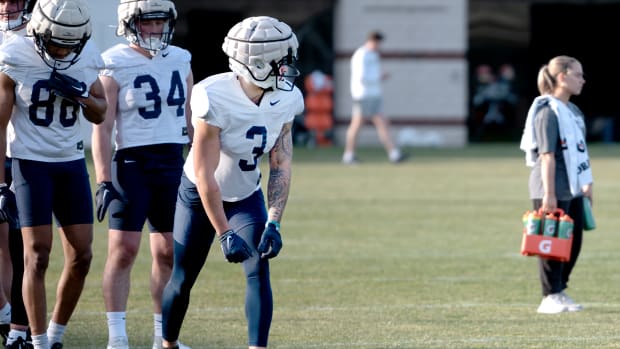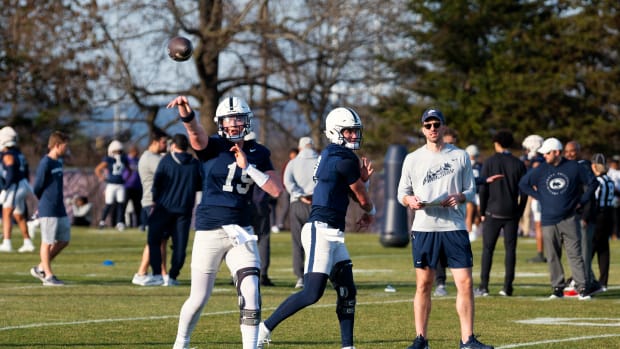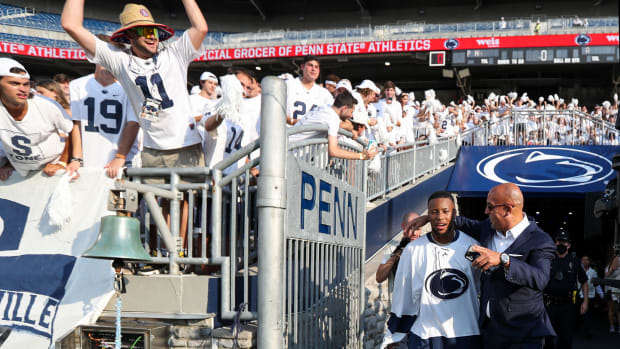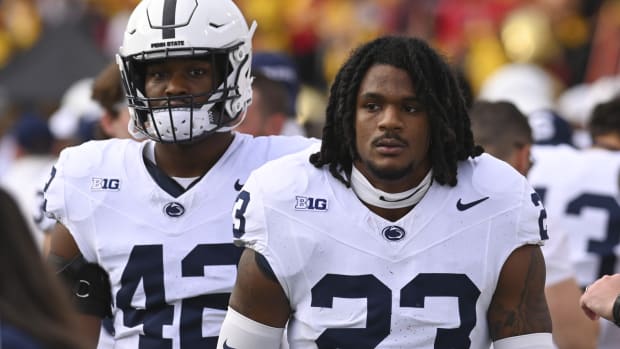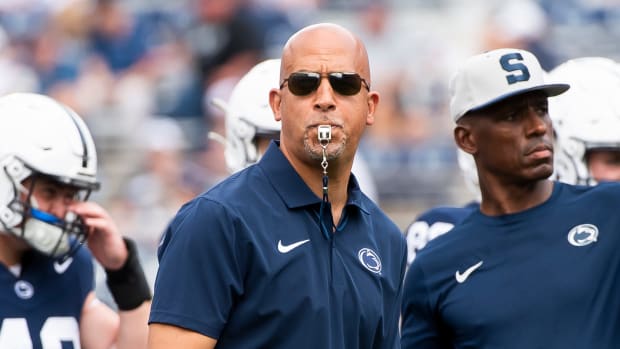James Franklin: 'The Cream's Going to Rise to the Top in Some Ways'
Penn State coach James Franklin joined SI.com recently for a Q&A about how the program has handled the past three months apart. Franklin discussed video chats, the challenges of resuming workouts and the discussions he’s having with players and their parents.
Here’s an excerpt from the interview, conducted before the nationwide demonstrations that took place in response to the death of George Floyd. Franklin addressed that with his team and on social media.
As a reminder: Most Penn State players will return to campus June 8, with voluntary workouts resuming June 15.
Q: What have you and the team accomplished in the past few months?
James Franklin: It’s been eye-opening in some ways. It’s obviously been challenging, and [there has] been a lot of adversity that everybody’s had to overcome in this situation. We’re a little bit different, because we had no spring ball practices, whereas some schools, even Northeast schools, got a number of spring-ball practices in. One of the things that was really challenging was that our students were on spring break when this happened, so they didn’t have their books with them and weren’t able to come back to practice. So that was challenging.
So for me, the embrace of technology by our staff and our organization [is something] I’ve been really proud of. It’s made us realize that a lot of these things that we’re doing now, we should have been using all along. You think about that. We go on vacation in the summer typically, it’s a great way to stay connected with your players. You can still have meetings when you’re on the road recruiting. You’re disconnected from your players; you can Zoom with them and check with them. … It’s forced us out of our comfort zone, but I think there are a lot of positives to come out of it.
Q: So how do you begin reintegrating the program into football activities?
Franklin: The biggest challenge I could share is, making sure that everybody understands this: Don’t think that, when this ends and we all come back, it’s going to be normal. So what we’ve been trying to do is, start to have conversations with the parents, the players and the staff about what it may look like. Because I think if you wait until the last minute and say, OK, we’re coming back next Friday, and these are all the policies put in place, it’s going to be a shock to everybody’s system.
Whereas I think if you can start to talk about what it may look like, it allows people to start to emotionally kind of work through what that may mean. And it also helps us because there’s going to be a system of checks and balances, there are going to be some questions and concerns that come up that we haven’t thought of that are valuable as well. … There‘s been a bunch of work that’s been put in from football, a bunch of work from the athletic administration, a bunch of work put in by the university and it has to go in that order all the way up to the governor of the state. … It’s not going to be like, this thing ends and we’re all going to jump right back on the horse. It’s going to be a process.
Q: What personal guardrails will you lean on in order to return safely?
Franklin: No. 1, I’m going to be as hypersensitive to this as anybody, because my daughter [Addison] has Sickle cell [disease]. Literally, I have not left our property in four weeks. We have groceries delivered, wipe them down before they come. We have not left the property. We’re very strict. That’s the challenge. Depending on who you talk to, quarantine for one person compared to another is very different, right? We see that on social media, all of us.
For me, I think it starts with, for the players, the staff, this is going to be a voluntary thing, where we can’t say everybody is coming back. You’ve got to be comfortable with coming back. If the staff is not comfortable coming back, we need to know that so we can plan for it. If players are not comfortable coming back, or their parents are not comfortable with them coming back, that’s perfectly understandable. We’ll make it work. But it’s also our job to put all the policies and procedures in place that people feel comfortable coming back.
It’s interesting. You read some stuff and you see some stuff and you say, 'Well, you can’t come back until there’s a cure.' What if there’s not a cure for five years? Or what if there’s never a cure? We’re going to have to come back at some point, and we’re going to lean on the experts, the medical experts, the scientists and the government to say when it is the right time to make that decision.
Q: What discussions are you having with players and their parents about returning?
Franklin: If they have concerns, if they’re uncomfortable, it’s going to be their choice whether they want to come back or not. That’s them and their parents. For us, it’s, here are all the policies, all the procedures, here are all the things we’re going to try to do to make this in everybody’s best interests. And after reading that, if you’re not comfortable, then you shouldn’t come back. And that’s every parent’s right, and that’s every student-athlete’s right. There will be no pressure from us.
I say that because I talked to the players and followed the players on social media and I see what’s going on for most of them. Most of them aren’t quarantining like I am. And, to be honest with you, I also have a concern for our staff, because really our most at-risk group is the staff, not the players.
Q: One of your core values is competition. How have your players created that over the past few months?
Franklin: In any industry or business or team or organization or whatever it is, there are certain people who are very self-driven and very self-motivated. Then there are others who do great work but they need to be pushed a little bit more by management, they need to be pushed a little bit more by their co-workers or teammates or whatever it may be. Then you’ve got some people who you’ve really got to push to do the work necessary to be successful.
I think right now, probably more so than ever, there’s going to be a gap between those guys in your organization, and I think in some ways that’s going to be really valuable because you’re going to see who has the commitment and the determination and the drive to really be successful. And the cream’s going to rise to the top in some ways.
Q: So what will your team look like when it returns?
Franklin: I hope great, but it will be a little bit of a smorgasbord. I think you’ll have some guys who will look phenomenal because they’re at home and maybe they’re in a situation where mom and dad can provide a lot of things they need. And you’re going to have some guys come back and don’t look great or aren’t in great shape, and it’s not their fault. It’s based on circumstances. It’s all over the map, and it’s for a variety of reasons.
